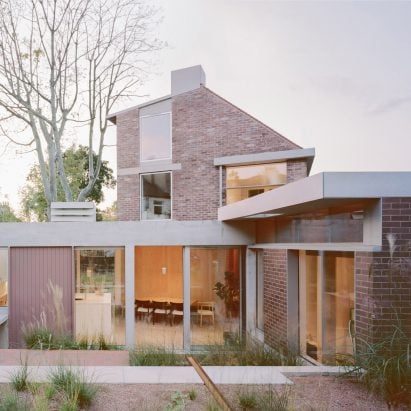Six Columns, the self-designed home of architect Will Burges in London, has been named RIBA House of the Year for 2024.
Located on a tight wedge-shaped site in Crystal Palace, the house was designed by Burges with his studio 31/44 Architects for himself, his wife and two growing children.
Six Columns in London has been named RIBA House of the Year for 2024
Six Columns was hailed by the Royal Institute of British Architects (RIBA) for its adaptable design, which is hoped to accommodate the changing needs of Burges and his family over time.
The chair of the jury, Studio Weave director Je Ahn, said this “demonstrates an important message that we should all remember”.
It is designed to blend into the suburban streetscape
“Building your own home is a hugely intensive endeavour; if you are lucky enough to do it at all, you will probably only ever do it once in your life,” said Ahn.
“This philosophy of the home as a lifelong process might be a tricky concept in this fast-paced contractual world, however, Six Columns demonstrates an important message that we should all remember; your home is not a static slice of time, but continuously evolves with you,” he continued.
The Royal Institute of British Architects hailed it for its adaptable design
The House of the Year prize is awarded annually by the RIBA to the best one-off house by an architect in the UK. Six Columns was selected as the winner for 2024 from a six-strong shortlist also including Peckham House by Surman Weston and Farmworker’s House by Hugh Strange Architects.
The other three shortlisted projects for this year’s prize were Eavesdrop by Tom Dowdall Architects, The Hall by TaylorHare Architects and Plas Hendy Stable Block by Studio Brassica Architects.
Externally, Six Columns is intended to align with the surrounding 1950s streetscape, defined by a pared-back material palette of tactile brick and terracotta tiles.
However, upon closer inspection, it is animated by a range of eclectic details with multiple influences, including the Barcelona Pavilion by Mies van der Rohe and the brutalist style of architecture.
Its interiors featured exposed wood and concrete details
Throughout the interior, rooms are finished with a tactile palette of exposed concrete and painted brickwork, as well as untreated spruce joinery that is intended to be easily adjusted in the future.
Other key features of its interior include a mix of flexible open-plan living spaces alongside more contained, modular bedroom areas, which can be tailored to the family over time.
It was designed by architect Will Burges for his family
RIBA president Muyiwa Oki described Six Columns as a “beautifully crafted family home”.
“It shows what can be achieved when working with even the tightest of suburban sites, and its flexible, unfinished aesthetic offers a solution to futureproofed design: this is a home that can evolve with its occupants’ changing needs over time,” said Oki.
Last year’s winner of RIBA House of the Year the riad-inspired Green House by Hayhurst & Co, which was described by the jury as “a true oasis within the city”.
Previous recipients include Red House by David Kohn Architects and House on the Hill by Alison Brooks Architects.
The video is by RIBA and the photography is by Building Narratives.
The post “Home that can evolve” in London named UK’s best new house appeared first on Dezeen.

